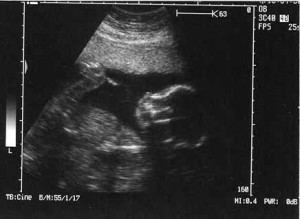
Each year in the UK, around 3,000 babies develop a serious bowel problem called necrotising enterocolitis (NEC). Sadly, up to 35 per cent of these babies die and survivors often develop long-term health problems.1
The disease typically strikes without warning. By the time it is diagnosed, babies are often already extremely ill. Researchers are now developing a new diagnostic test, which could allow babies with the disease to be identified and treated sooner. They hope this will reduce the likelihood of the disease progressing and therefore limit the devastating consequences.
Dr Alexandra Dedman, Senior Research Evaluation Manager, for Action Medical Research, said: “Up to 8 per cent of newborns in neonatal units develop this disorder. Doctors and nurses must be constantly on the lookout for symptoms of NEC, as premature babies in neonatal units can develop the disease at any time, with little or no warning.
“No current test can reliably identify babies in the early stages of the disease so we are really pleased to be funding this important research project which could make such a difference to babies’ lives.”
Babies who develop NEC can need emergency surgery to remove damaged parts of their intestines. Up to half of babies who survive the disease develop health problems. Some fail to put on weight properly, they can develop serious infections and liver damage, and nutritional problems can mean they have to be fed through a tube that goes directly into their bloodstream. Babies can also develop significant hearing, vision and movement problems.
Highly experienced researchers from Birmingham and Bristol are collaborating on this project to design a new sensor, which could allow screening of premature babies for NEC to become routine – for the first time ever.
The design of the sensor should mean it is suitable for regular use alongside babies’ cots in neonatal units. If the results of this project are positive, then clinical trials would follow.
The project leader, Dr Andrew Ewer, from the Neonatal Unit at Birmingham Women’s Hospital, will oversee the clinical aspects of the study – recruiting babies to take part in the study, from five neonatal units in the West Midlands, collecting samples and gathering data on the babies’ health.
Dr Ewer said: “In earlier work, we made an exciting discovery, which we believe could lead to a major breakthrough in the diagnosis of NEC. Our research found preliminary evidence that suggests the composition of a baby’s faeces changes in a characteristic way if he, or she, develops NEC.
“We think that these changes begin early in the disease process, before the baby experiences any obvious symptoms and we want to study a larger group of up to 1,200 premature babies, who were all born at least six weeks early,” he added.
The team is now developing the sensor which works by detecting gases – or, more specifically, volatile organic compounds – that are emitted by babies’ faeces early in the disease process.
Researchers at Bristol Royal Infirmary, University Hospitals Bristol NHS Foundation Trust and University of the West of England in Bristol, are undertaking the laboratory work. They have cutting-edge skills in analysing the complex mixture of gases emitted by faeces and are very experienced in the statistical analysis of vast data sets, like the ones that are being generated in this study.
The project has been funded for two and a half years with a grant of £131,638 from Action Medical Research.